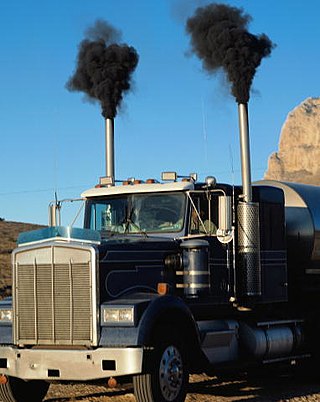
Pollution is the introduction of contaminants into the natural environment that cause adverse change. Pollution can take the form of any substance or energy. Pollutants, the components of pollution, can be either foreign substances/energies or naturally occurring contaminants.

Smog, or smoke fog, is a type of intense air pollution. The word "smog" was coined in the early 20th century, and is a portmanteau of the words smoke and fog to refer to smoky fog due to its opacity, and odor. The word was then intended to refer to what was sometimes known as pea soup fog, a familiar and serious problem in London from the 19th century to the mid-20th century, where it was commonly known as a London particular or London fog. This kind of visible air pollution is composed of nitrogen oxides, sulfur oxide, ozone, smoke and other particulates. Man-made smog is derived from coal combustion emissions, vehicular emissions, industrial emissions, forest and agricultural fires and photochemical reactions of these emissions.

The God of Small Things is a family drama novel written by Indian writer Arundhati Roy. It is a story about the childhood experiences of fraternal twins whose lives are destroyed by the "Love Laws" prevalent in 1960s Kerala, India. The novel explores how small, seemingly insignificant occurrences, decisions and experiences shape people's behavior in deeply significant ways. The novel also explores the lingering effects of casteism in India, lending a culturally-specific critique of British colonialism in India. It won the Booker Prize in 1997.
Robert C. Balling, Jr. is a professor of geography at Arizona State University, and the former director of its Office of Climatology. His research interests include climatology, global climate change, and geographic information systems. Balling has declared himself one of the scientists who oppose the consensus on global warming, arguing in a 2009 book that anthropogenic global warming "is indeed real, but relatively modest", and maintaining that there is a publication bias in the scientific literature.

The car-free movement is a broad, informal, emergent network of individuals and organizations, including social activists, urban planners, transportation engineers, environmentalists and others, brought together by a shared belief that large and/or high-speed motorized vehicles are too dominant in most modern cities. The goal of the movement is to create places where motorized vehicle use is greatly reduced or eliminated, by converting road and parking space to other public uses and rebuilding compact urban environments where most destinations are within easy reach by other means, including walking, cycling, public transport, personal transporters, and mobility as a service.

Exhaust gas or flue gas is emitted as a result of the combustion of fuels such as natural gas, gasoline (petrol), diesel fuel, fuel oil, biodiesel blends, or coal. According to the type of engine, it is discharged into the atmosphere through an exhaust pipe, flue gas stack, or propelling nozzle. It often disperses downwind in a pattern called an exhaust plume.

A green vehicle, clean vehicle, eco-friendly vehicle or environmentally friendly vehicle is a road motor vehicle that produces less harmful impacts to the environment than comparable conventional internal combustion engine vehicles running on gasoline or diesel, or one that uses certain alternative fuels. Presently, in some countries the term is used for any vehicle complying or surpassing the more stringent European emission standards, or California's zero-emissions vehicle standards, or the low-carbon fuel standards enacted in several countries.

Human impact on the environment refers to changes to biophysical environments and to ecosystems, biodiversity, and natural resources caused directly or indirectly by humans. Modifying the environment to fit the needs of society is causing severe effects including global warming, environmental degradation, mass extinction and biodiversity loss, ecological crisis, and ecological collapse. Some human activities that cause damage to the environment on a global scale include population growth, neoliberal economic policies and rapid economic growth, overconsumption, overexploitation, pollution, and deforestation. Some of the problems, including global warming and biodiversity loss, have been proposed as representing catastrophic risks to the survival of the human species.
Ontario's Drive Clean is an automobile emissions control program introduced by the Government of Ontario and came into effect April 1999. The program was initially intended to weed out vehicles producing unrestrained amounts of particulate emissions contributing to smog and increasing pollution. It applies only to vehicles registered in southern parts of Ontario from Windsor to Ottawa due to the volume of vehicles in that part of the province. It is administered by privately owned facilities that have been accredited by Ontario's Ministry of the Environment and Climate Change (MOECC) and the Ministry of Transportation (MTO).

The fuel economy of an automobile relates to the distance traveled by a vehicle and the amount of fuel consumed. Consumption can be expressed in terms of the volume of fuel to travel a distance, or the distance traveled per unit volume of fuel consumed. Since fuel consumption of vehicles is a significant factor in air pollution, and since the importation of motor fuel can be a large part of a nation's foreign trade, many countries impose requirements for fuel economy.
Massachusetts v. Environmental Protection Agency, 549 U.S. 497 (2007), is a 5–4 U.S. Supreme Court case in which Massachusetts, along with eleven other states and several cities of the United States, represented by James Milkey, brought suit against the Environmental Protection Agency (EPA) represented by Gregory G. Garre to force the federal agency to regulate the emissions of carbon dioxide and other greenhouse gases (GHGs) that pollute the environment and contribute to climate change.

Car dependency is the concept that some city layouts cause cars to be favoured over alternate forms of transportation, such as bicycles, public transit, and walking.

A car, or an automobile, is a motor vehicle with wheels. Most definitions of cars state that they run primarily on roads, seat one to eight people, have four wheels, and mainly transport people, not cargo.

The Clean Air Act (CAA) is the United States' primary federal air quality law, intended to reduce and control air pollution nationwide. Initially enacted in 1963 and amended many times since, it is one of the United States' first and most influential modern environmental laws.

The environmental effects of transport are significant because transport is a major user of energy, and burns most of the world's petroleum. This creates air pollution, including nitrous oxides and particulates, and is a significant contributor to global warming through emission of carbon dioxide. Within the transport sector, road transport is the largest contributor to global warming.

The California Smog Check Program requires vehicles that were manufactured in 1976 or later to participate in the biennial smog check program in participating counties. The program's stated aim is to reduce air pollution from vehicles by ensuring that cars with excessive emissions are repaired in accordance with federal and state guidelines. With some exceptions, gasoline-powered vehicles, hybrid vehicles, and alternative-fuel vehicles that are eight model-years old or newer are not required to participate; instead, these vehicles pay a smog abatement fee for the first 8 years in place of being required to pass a smog check. The eight-year exception does not apply to nonresident vehicles being registered in California for the first time, diesel vehicles 1998 model or newer and weighing 14,000 lbs or less, or specially constructed vehicles 1976 and newer. The program is a joint effort between the California Air Resources Board, the California Bureau of Automotive Repair, and the California Department of Motor Vehicles.

Individual action on climate change can include personal choices with regards to diet, travel, lifestyle, consumption of goods and services, family size and so on. Individuals can also get active in local and political advocacy work around climate action. People who wish to reduce their carbon footprint, can for example reduce air travel and driving cars, they can eat mainly a plant-based diet, use consumer products for longer, or have fewer children. Avoiding meat and dairy foods has been called "the single biggest way" how an individual can reduce their environmental impact. Scholars find that excessive consumption is more to blame for climate change than population increase. High consumption lifestyles have a greater environmental impact, with the richest 10% of people emitting about half the total lifestyle emissions.

Tiffany Lynn Alvord is an American singer, songwriter and actress. She has been cited as one of YouTube's first "home-grown celebrities". She has a large social presence on YouTube with over 705 million video views and over 3.15 million subscribers. Alvord also has a strong following on social media sites including more than 2.6 million Facebook fans and over 350 thousand Twitter followers. In December 2012, Alvord performed in Times Square on the Nivea stage with Carly Rae Jepsen, Train, PSY and Taylor Swift as part of the 2012 New Year's Eve celebration.

Cars affect many people, not just drivers and car passengers. The externalities of automobiles, similarly to other economic externalities, are the measurable difference in costs for other parties to those of the car proprietor, such costs not taken into account when the proprietor opts to drive their car. According to Harvard University, the main externalities of driving are local and global pollution, oil dependence, traffic congestion and traffic collisions; while according to a meta-study conducted by the Delft University these externalities are congestion and scarcity costs, accident costs, air pollution costs, noise costs, climate change costs, costs for nature and landscape, costs for water pollution, costs for soil pollution and costs of energy dependency.















